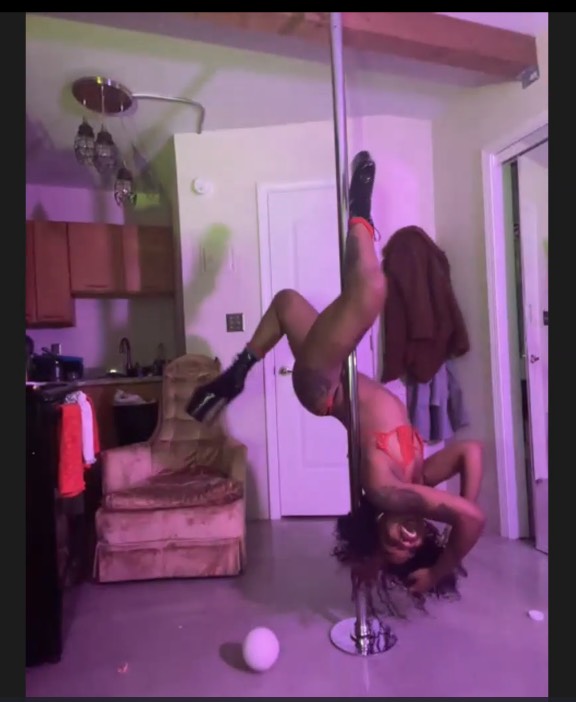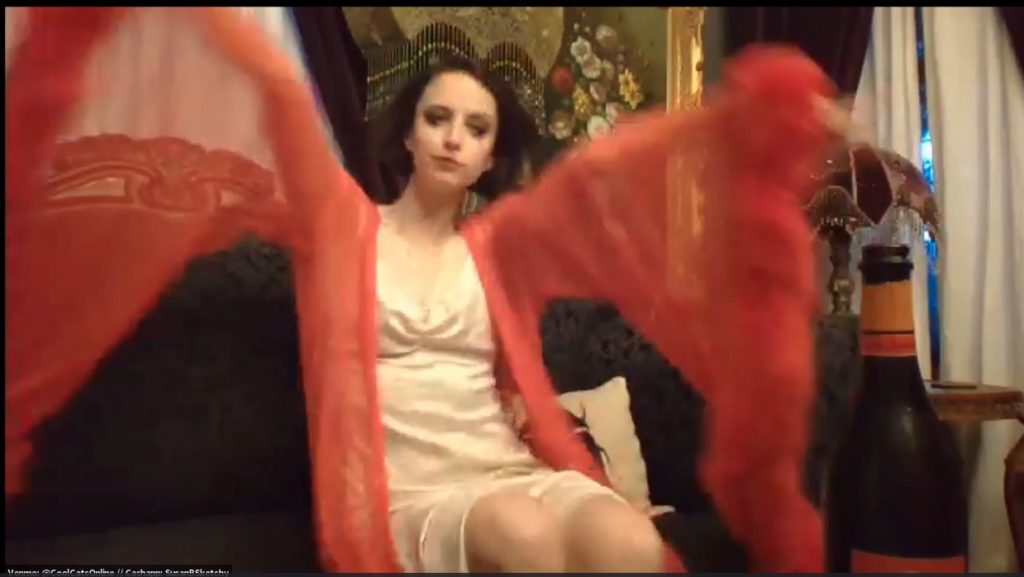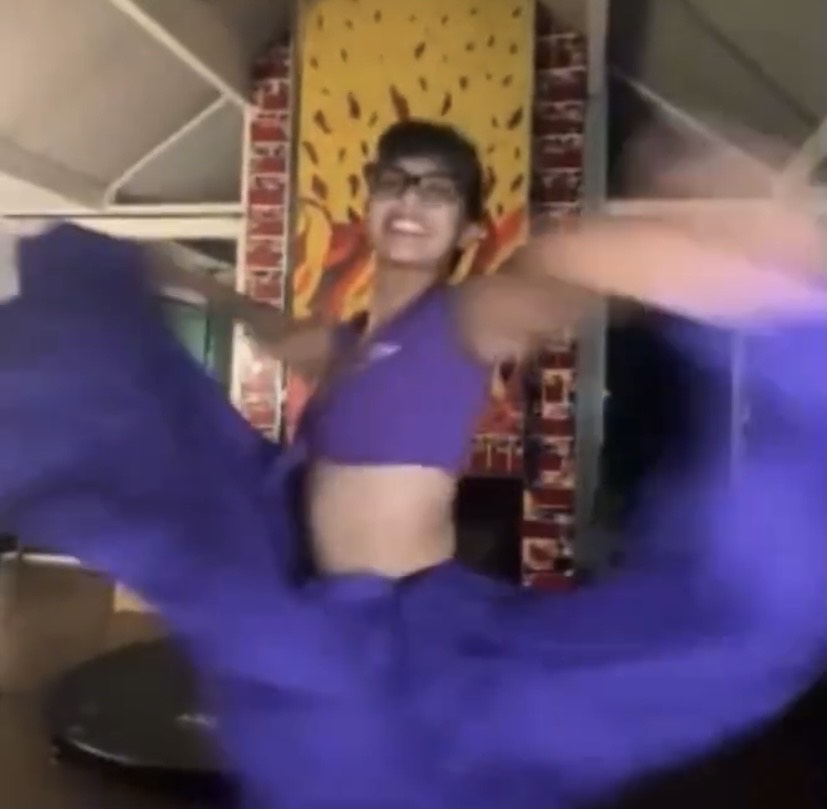Attending a Cool Cats Online show is probably the most fun you’ll ever have on Zoom. It’s wild, playful and kitschy, and feels like hanging out with your most fun friends who happen to be super creative and amazing dancers. Over roughly two hours, you’re transported into a sexy, campy world dreamed up and embodied by Charm, Susan B. Sketchy, Honey LeStrange and Teddy B. Ruxpin (their stage names), all former dancers at Cheetahs strip club in Hollywood.
It’s one of the more diverse, inclusive virtual strip shows to spring up during the pandemic, placing women of color — including Teddy and Honey, along with a rotating group of guest dancers — in charge and front and center. Many other virtual strip shows are led by or featured only white women; Teddy told me she and Susan B. Sketchy got asked to join one only after a white guest dancer dropped out and recommended them as replacements. Veteran stripper, writer, and activist Antonia Crane summed up Cool Cats this way: “It’s the best show, it’s the most fun. It’s the most diverse, it’s the most impressive…[I’ve loved] watching Cool Cats pivot to what the culture needed.”
Cool Cats was formed in the summer of 2020. It was conceived as a way for dancers to make ends meet while strip clubs were shuttered — Teddy calls it a form of mutual aid — but it was also a response to the wider problems plaguing the industry, long before the pandemic flipped it on its head. Cool Cats’ founders say strip clubs are notorious for finding ways to limit dancers’ earnings — including charging house fees and taking a cut of their private dances — and police their appearance. And even at an established strip club, the terms of employment can be tenuous: Charm, Susan, Teddy and Honey all say they were fired from Cheetah’s after Governor Gavin Newsom signed California’s AB5 into law in 2019. The legislation requires employers to provide benefits to employees — including dancers — who may have been previously misclassified as contractors. (A phone call to Cheetah’s for comment was not returned at press time.)
With Cool Cats, Charm, Susan, Teddy and Honey have created a supportive platform by and for dancers, in contrast to the often-toxic levels of competition encouraged by club owners. “Management really fosters heavy competition between girls [because] they know they’d actually be fucked if we all banded together,” Charm told me in a group interview. Charm, Susan, Honey and Teddy have done just that, banding together to take ownership over their bodies and earnings. Cool Cats started out as a weekly event, eventually moving to every other week, and it’s currently held monthly.
For each event, the dancers pick a coy theme — past themes have included Geek Luv 2.0, Spring Breakers, Modern Vices, and ones celebrating the hosts’ birthdays — along with their music, outfits and guest dancers, with each dancer staging and directing their own numbers from home via Zoom. For example, during the travel-themed event titled Anywhere but Here, Charm dressed as a sexy flight attendant and danced with her pet snake to Cardi B’s “Up” in front of a moving Zoom background of the inside of an airplane. There’s around six to eight dancers each session, and each do two numbers.
Their banter is both comedic and supportive, as they introduce the next dancer, compliment the prior one and set the scene for the evening, and they all have a space to promote their offerings, like Susan’s Patreon and Honey’s knit creations on Etsy. They also make everyone’s Venmo and CashApp info easy to find and actively encourage viewers to tip each dancer and the group via a pooled group Venmo. To encourage group tips and audience participation, dancers will do everything from share an embarrassing story to take a shot of alcohol to change their Zoom background to a photo sent by a viewer. Events are promoted on Instagram and tickets are sold in advance for $6.66; past episodes can be streamed on-demand on Vimeo for $10.
Though vaccines have rolled out and clubs have reopened, virtual strip shows are here to stay. For the founders of Cool Cats, the streaming series not only provides a vital source of supplemental income, but its organizers also see it as a safe and empowering outlet for their creativity. They also hope to create in-person versions of Cool Cats in the future. While some of the co-founders have found new gigs at in-person clubs, Cool Cats has allowed them to reconsider their agency. “It will be hard to go back to being under male management again… I plan to be very particular about where I’d like to go back,” Charm told me. “I can’t exactly go into every place and audition like I used to do. I need to be crafty.”
In a group interview, which has been edited and condensed for clarity, Teddy, Honey and Susan B. Sketchy talked about the challenges that come with stripping, the benefits of doing it online, and how racism rears its ugly head at clubs.
Teddy B. Ruxpin

The way I conceptualize dancing and performance on the online shows, we really make it a spectacle. There’s a lot going on, you work with props and costumes, and you try to tell a whole story in the span of a song, which is a lot different from working in a club. On one hand, I’m kind of hesitant to lose that. On the other hand — controversial opinion — that gets very tiring to do every week. And part of me just really wants to put some makeup on and a bikini and just show up [at a club]. I just have to be there, physically present. And like flop around on stage for a bit, and then get off. And that is all I have to do.
I don’t have to be like, “What’s the theme? What’s the vibe? The lighting? What are my angles? Will people get like the references I’m trying to make?” [Virtual shows are] really fun, but it’s so much work that goes into these shows, and part of me is really ready to go back to where there’s not as much work.
However, a lot of me is very hesitant to go back to the lack of agency you can have in clubs. Even before [going] online, I was working on engineering my dancing career to work in places where I could do whatever the fuck I want. Because I’ve moved from working in very corporate clubs to very non-corporate clubs, and I went, “Oh, I’m not going back to that shit.” I’m not going to let anyone be like, “You can’t do that song.” No, I’m gonna do whatever I want, whenever I want. It’s not fun if I don’t get to do that.
And online is the ultimate expression of that because we plan the shows, we pick the times, we do everything. The thought of going back to being under management is very gross to me. Also, the thought of real life interacting with customers — I don’t know if I can deal with it. My personal interaction skills have decreased over the pandemic. It’s easier to be charming online, it’s easier to be patient, and to be like, “Oh, you’re a little bit gross, but I can be cute. I can be funny about it. It’s okay.” But going back to seeing men in real life, and being close to them [laughs] and being like, “Ah, I gotta touch you.” I’m very hesitant about it.
Honey LeStrange
I totally agree, that’s what I was thinking actually about, the in-person thing, because it is a lot of work. That’s the hardest thing about stripping for me, is the talking to people. Talking to people, especially men, it’s just so hard for me. So I feel like online, when [Cool Cats] first started, it almost was like a safe haven and it was a lot more fun. And with the themes and all this stuff, it became this crazy monster with a life of its own.
And it would almost be nice to kind of get that feeling of just hanging with your friends and dancing again, without having to be structured and, you know, you have to do this on this day and these documents and all this. It’s like, “Well, can we just have some fun?” I feel like getting the actual magic of being inside of the club without actually having to speak to any customers in person would be so ideal. And that is such a hard thing, especially, again, working with other people and feeling like not wanting to be managed. I’m trying to have a creative balance between that. Yeah, so in a perfect world, I’d keep going [to clubs], but without the stress. [Laughs]
Susan

I would love to just kind of put my brain in a jar and go shake my ass on stage, collect my money, say thank you and go home… I don’t know, I feel like with Cool Cats, we try to simulate a strip club on it, but it’s also become its own thing. And I feel like there’s always going to be a space and an audience for that. If things locked down again, there’s still going to be people interested in it. And I think like there’s always going to be people that want to see our creative output.
Honey LeStrange
I actually did have a friend of mine tell me that they liked [watching] the online shows better, because they could do a dual screen and be at home with their dog in pajamas and like playing WOW and also watching dancers.
Teddy
I think, specifically in California, but this generally applies to everywhere: sex work is work. Stripping is a job. This is obvious, but therefore, basic employee protections are what strippers would need. [We need] support for the most vulnerable members of our communities so that we can be sure that sex work is a choice for everyone. Because if it’s a choice between stripping and homelessness, it’s not really a choice. That’s not fair for anybody in our community. So we need support to make sure that if you’re in this industry, it’s an industry that you want to be in and that you feel supported in, feel safe in, and that you’re making money in.
Go to the strip club, and give money, don’t just go. At Cheetahs, people would come and we’d be like, “Okay, are you getting something?” This is my real-life job. It would shock me because people will always go, “Don’t do something else [for work]?” For most of my time stripping, I didn’t. I was like, “No, this is how I pay my rent; give me money. [Laughs] We both live in L.A., it costs a lot of money to live here.”
I don’t want to expose the industry, but we are not making as much money as you think. The girls on Instagram are lying to you. You are watching the top one percent of our job and going “You’re all making that.” We are not. So whatever you assume we’re making, don’t assume, just give money.
Honey LeStrange

And check your biases, because I noticed, even with women too, even if it’s not about attraction, women will see certain things done by certain people with certain body types or who are Black, or whatever, and they’ll see certain moves, and you’ll see them cringing or [thinking] “That’s dirty, that’s nasty, that’s stereotypical stripper stuff.” But then, a little thin white girl literally will do the exact same shit, and they’re like, “Yes, yes!” And it’s just because it looks different on a smaller body. It looks different on a paler body. It looks less vulgar because of societal biases.
Check your money biases as well. Why do you think it’s okay to give one person money but not another person money? Can you go on stage and dance in nine inch heels? Can you even walk in the four inch heels that you’re wearing? No, I saw you walk in the club, you can’t. That kind of attitude was always just so shocking to me because I’m like, what is it that we’re doing that’s so cringeworthy that we can’t have a dollar?
Teddy
If you are going to support dancers, support all dancers. Working as a dancer of color, especially as a Black dancer, no one understands about how much it can be fucking miserable a lot of the time. And a lot of people don’t examine the way their overarching preferences, which are informed by society, therefore inform who they give money to and who doesn’t make money.
And while there is competition in strip clubs, it is especially reinforced across racial hierarchies. I don’t think people understand that Black dancers and white dancers dance and work in completely different worlds, and we make completely different money. And we have completely different customers. It is so separate.
So I will also say if you are going to clubs to support dancers, support the dancer whether you’d fuck her or not, [laughs] which seems really uncouth. If you’re really like, “I’m here for the artistry and for the athleticism,” then you have to acknowledge the work that everyone’s put in.
What I would always say to people that come in who’d be like, “Well, I don’t know if it’s really that hard,” I would take my shoes off be like, “Go ahead. I actually have a bikini in the back if you want it. I will tell them what song you want to do. Girl, take my job. I want to see you do it.”
(Header collage by Evan Solano / Photos courtesy of Cool Cats)